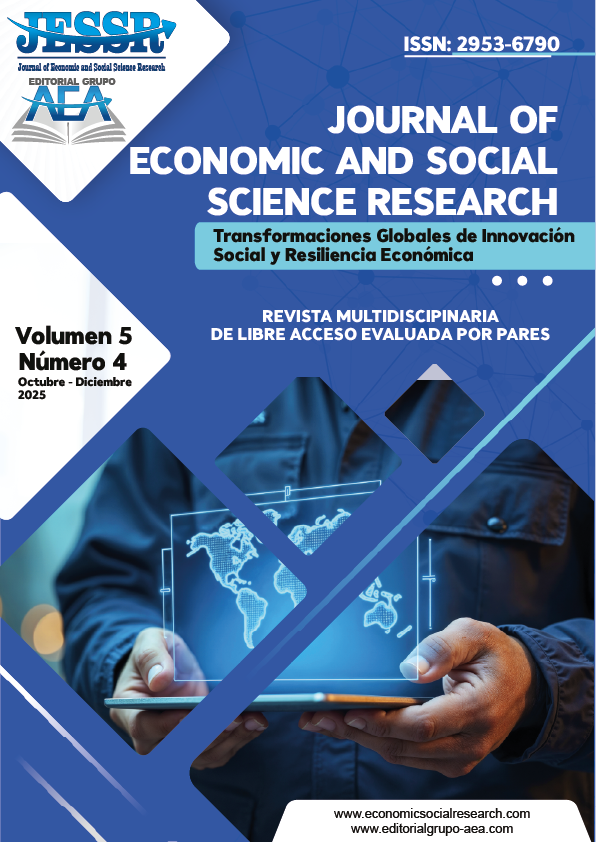Knowledge Management and Organizational Performance in the Faculty of Engineering of a Peruvian University
Main Article Content
Abstract
The limited articulation between knowledge management and institutional processes represents a persistent challenge in Peruvian universities, affecting their efficiency, innovation, and educational quality. In response to this issue, the present study aimed to analyze the impact of Knowledge Management (KM) on Organizational Performance (OP) in the Faculty of Engineering of a Peruvian university, addressing a gap in empirical research within the national context. A quantitative, non-experimental, and correlational-causal approach was applied, with a sample of 108 participants (66 faculty members and 42 administrative staff). Data were analyzed using multiple regression and ANOVA. The results showed that KM significantly influences OP (p=0.000). In the faculty group, the model was statistically significant (p=0.000), highlighting perception (p=0.002) and decision-making (p=0.006) as the most relevant predictors. In contrast, in the administrative group, the model was not significant (p=0.134), although knowledge creation showed a particular impact (p=0.035). The findings demonstrate that adequate knowledge management contributes to improving institutional efficiency, effectiveness, and perceived quality, reinforcing the need to strengthen university policies focused on organizational learning and knowledge-based decision-making.
Downloads
Article Details
Section

This work is licensed under a Creative Commons Attribution-NonCommercial 4.0 International License.
How to Cite
References
Barros-Contreras, I., Morales-Serazzi, M., Torres-Toukoumidis, A., & Palma-Ruiz, J. M. (2022). Knowledge Integration and Organisational Performance of Data Analytics in the Family Business. Journal of Open Innovation: Technology, Market, and Complexity, 8(3), 135. https://doi.org/10.3390/joitmc8030135 DOI: https://doi.org/10.3390/joitmc8030135
Choo, C. W. (1996). The knowing organization: How organizations use information to construct meaning, create knowledge and make decisions. International Journal of Information Management, 16(5), 329-340. https://doi.org/10.1016/0268-4012(96)00020-5 DOI: https://doi.org/10.1016/0268-4012(96)00020-5
Davenport, T., & Prusak, L. (1998). Working Knowledge: How Organizations Manage What They Know. En Ubiquity (Vol. 1). https://doi.org/10.1145/348772.348775
Díaz, N, Jiménez, M, & Leonard, A. (2025). Gestión del conocimiento y su impacto en las instituciones de educación superior: una revisión sistemática. Revista InveCom, 5(3), e050396.https://doi.org/10.5281/zenodo.14618990
Hernández, R., & Mendoza, C. (2018). Metodología de la investigación: Las rutas cuantitativa, cualitativa y mixta. McGraw-Hill. https://centrohumanista.edu.mx/biblioteca/files/original/5121ad6aa80b501a60abcb26790c7762.pdf
Huacasi, R. (2021). Prácticas de gestión del conocimiento y su influencia en la gestión organizacional de la Unidad Médico Legal y Ciencias Forenses del Ministerio Público de Tacna, 2018 [Tesis de maestría, Universidad Privada de Tacna]. Repositorio UPT. http://repositorio.upt.edu.pe/handle/20.500.12969/2085
Liu, G., Kianto, A., & Tsui, E. (2023). Knowledge management technologies and organizational performance: A meta-analytic study. Industrial Management & Data Systems, 123(2), 386-408. https://doi.org/10.1108/IMDS-02-2022-0121 DOI: https://doi.org/10.1108/IMDS-02-2022-0121
Markić, M., Požega, Ž., & Crnković, B. (2022). The Impact of Knowledge Management on the Economic Indicators of the Companies. South East European Journal of Economics and Business, 17(2), 34-48. https://doi.org/10.2478/jeb-2022-0013 DOI: https://doi.org/10.2478/jeb-2022-0013
Nonaka, I., & Takeuchi, H. (1995). La organización creadora del conocimiento. Oxford University Press. https://masteradmon.wordpress.com/wp-content/uploads/2013/04/la-organizacic3b3n-creadora-del-conocimiento-pdf.pdf
Oviedo, H., & Campo-Arias, A. (2005). Aproximación al uso del coeficiente Alfa de Cronbach”. Revista Colombiana de Psiquiatría, 34, 572-580. https://www.researchgate.net/publication/284821545_Aproximacion_al_uso_del_coeficiente_Alfa_de_Cronbach
Padilla Ornelas, P. J., & Martínez Serna, M. del C. (2018). Gestión del conocimiento y su influencia sobre el desempeño organizacional en las empresas de Aguascalientes. Investigación y Ciencia: de la Universidad Autónoma de Aguascalientes, 75, 55-65. https://dialnet.unirioja.es/servlet/articulo?codigo=6579486 DOI: https://doi.org/10.33064/iycuaa2018751770
Piedra-Castro, W. I. (2025). Enseñanza de las ciencias sociales con metodologías pedagógicas de inteligencia artificial. Journal of Economic and Social Science Research, 5(1), 119–130. https://doi.org/10.55813/gaea/jessr/v5/n1/164 DOI: https://doi.org/10.55813/gaea/jessr/v5/n1/164
Santa Cruz Malon, A., Córdova Rodas, N. A., Cruz Tarrillo, J. J., & Almestar Villegas, C. (2021). Gestión del conocimiento y efectividad organizacional en municipalidades de la provincia de San Martín, Perú. Revista en Gobierno y Gestión Pública, 9(1), 30-43. https://doi.org/10.24265/iggp.2022.v9n1.02 DOI: https://doi.org/10.24265/iggp.2022.v9n1.04
Toscano-Quispe, S. Y. ., Borja-Bazurto, I. N., Lata-Jiménez, C. M., & Ayavaca-Apolo, M. F. (2025). Estrategias para la sostenibilidad de proyectos educativos en zonas rurales de la Amazonia ecuatoriana. Journal of Economic and Social Science Research, 5(2), 87-100. https://doi.org/10.55813/gaea/jessr/v5/n2/190 DOI: https://doi.org/10.55813/gaea/jessr/v5/n2/190
Tuco, C. M. C. (2018). Modelo para la mejora del desempeño organizacional a través de las prácticas de la gestión de la calidad, gestión del conocimiento y liderazgo transformacional en una universidad privada. Apuntes Universitarios. Revista de Investigación, 8(3). https://www.redalyc.org/journal/4676/467657107004/ DOI: https://doi.org/10.17162/au.v8i3.163
Vera Diaz, N. R. (2022). La eficacia de la gestión del conocimiento y los resultados obtenidos en la unidad de gestión educativa local N° 7, Distrito de San Borja, Junio 2019-Julio 2021. Centro de Altos Estudios Nacionales - Escuela de Posgrado. https://renati.sunedu.gob.pe/handle/sunedu/3155598





